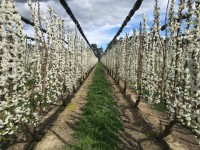Modern Stone Fruit Training Systems Webinar
Event Details
Date
March 16, 2021
Time
11:00am-1:00pm
Cost
Registration : $20.00
(addl attendee $20.00 ea.)
Host
Eastern New York Commercial Horticulture
While yields of stone fruits planted to traditional orchard systems have been lagging behind our modern apple plantings in the northeast, research is actively being conducted to utilize improved rootstocks and modern, narrow training systems to increase productivity and reduce labor costs in peach and cherry systems.
In this webinar, we will be joined by Dr. Jim Schupp, Dr. Greg Lang, and Dr. Terence Robinson, as they review modern strategies for growing peaches and cherries in the northeast.
Agenda:
11:00am: Welcome and Introductions - Mike Basedow - Cornell ENYCHP
11:05 - 11:40: Future Directions for Peach Training Systems - Dr. Jim Schupp - Penn State's Fruit Research and Extension Center
Peaches are a labor-intensive crop, but peach yields per acre lag those of other fruit crops. Gains in orchard productivity and production efficiency are needed if peaches are to remain an important part of a fruit grower's portfolio. Intensive peach systems warrant our attention, as we search for more labor efficient methods of growing fruit, and for systems that can readily adapt to mechanization and automation. This presentation provides an update on two recent studies to evaluate tree density and rootstocks in high density peach systems.
11:40 - 12:15: The Evolution of Sweet Cherry Production Systems - Dr. Greg Lang - Michigan State University
Sweet cherry canopy architectures and training systems for fresh market production have evolved over the past two decades, accelerated by the advent of vigor-controlling and precocity-inducing rootstocks. Training systems are dynamic and continuously evolving, as every grower and orchard site is different, with inherent traits that lead to subtle modifications of initial ideas and training concepts that can significantly affect their ultimate degree of success. It is important for growers to understand their orchard vigor factors, target markets, the fundamental aspects of sweet cherry growth and fruiting, and how the techniques used in different training systems affect those fundamentals.
12:15 - 12:50: New Rootstocks and Training Systems for Peaches and Cherries, Plums and Apricots in the Northeast - Dr. Terence Robinson - Cornell University
Dr. Robinson will discuss improved rootstocks for peach that can be combined with closer tree spacings to achieve greater productivity in northeast orchards. On the cherry side he will also discuss new rootstocks and how they can be combined with closer spacings, and will provide management recommendations to achieve early and sustained production.
12:50 - 1:10: Grower Comments, Q & A, Final Wrap-Up

Upcoming Events
2026 Northeast Extension Fruit Consortium Winter Webinar Series
February 4, 2026 : Management of Up and Coming Strawberry Diseases in the Northeastern United States
Session 1: Management of Up and Coming Strawberry Diseases in the Northeastern United States
February 11, 2026 : Kiwiberry Production in the Northeast
Session 2: Kiwiberry Production in the Northeast
February 18, 2026 : Heat Mitigation- Sunburn and Fruit Coloring
Session 3: Heat Mitigation- Sunburn and Fruit Coloring
February 25, 2026 : The Dating Game- Updates in Lepidopteran Mating Disruption
Session 4: The Dating Game- Updates in Lepidopteran Mating Disruption
March 4, 2026 : USEPA Endangered Species Act Strategies and Pesticide Use
Session 5: USEPA Endangered Species Act Strategies and Pesticide Use
March 11, 2026 : Practical Drought Management for Fruit Growers
Session 6: Practical Drought Management for Fruit Growers
Managing the Invasive Swede Midge Webinar
March 6, 2026 : Managing the Invasive Swede Midge Webinar
Swede midge is an invasive fly that causes serious economic losses to brassica crops. Due to its small size and hidden feeding habits, swede midge is often called an "invisible pest" and damage may be misdiagnosed. In this webinar, we will review the swede midge life cycle and crop damage symptoms, current management recommendations, new research findings, and highlights from on-farm case studies with a focus on organic management.
New Farm Manager Skills Day - Get the Tools You Need to Grow Your People (Hudson Valley)
March 10, 2026 : New Farm Manager Skills Day - Get the Tools You Need to Grow Your People
Millbrook, NY
Are you moving into a supervisory farm management role this season and want to get off to a good start? Are you an experienced manager who wants to connect with other "people" managers and work on your skills? This one-day workshop is for you!












































